Georgia Last Will and Testament Form
A Georgia last will is an essential legal instrument that reflects the final wishes of a testator regarding their personal property and the way they’d want it to be distributed among chosen beneficiaries in detail (by indicating particular property or shares in percentages).
Here, we offer a free last will and testament form in PDF and DOC formats and the answers to the typical questions you may have concerning this specific document. For a more personalized experience, try using our document builder to create a custom last will valid in Georgia.
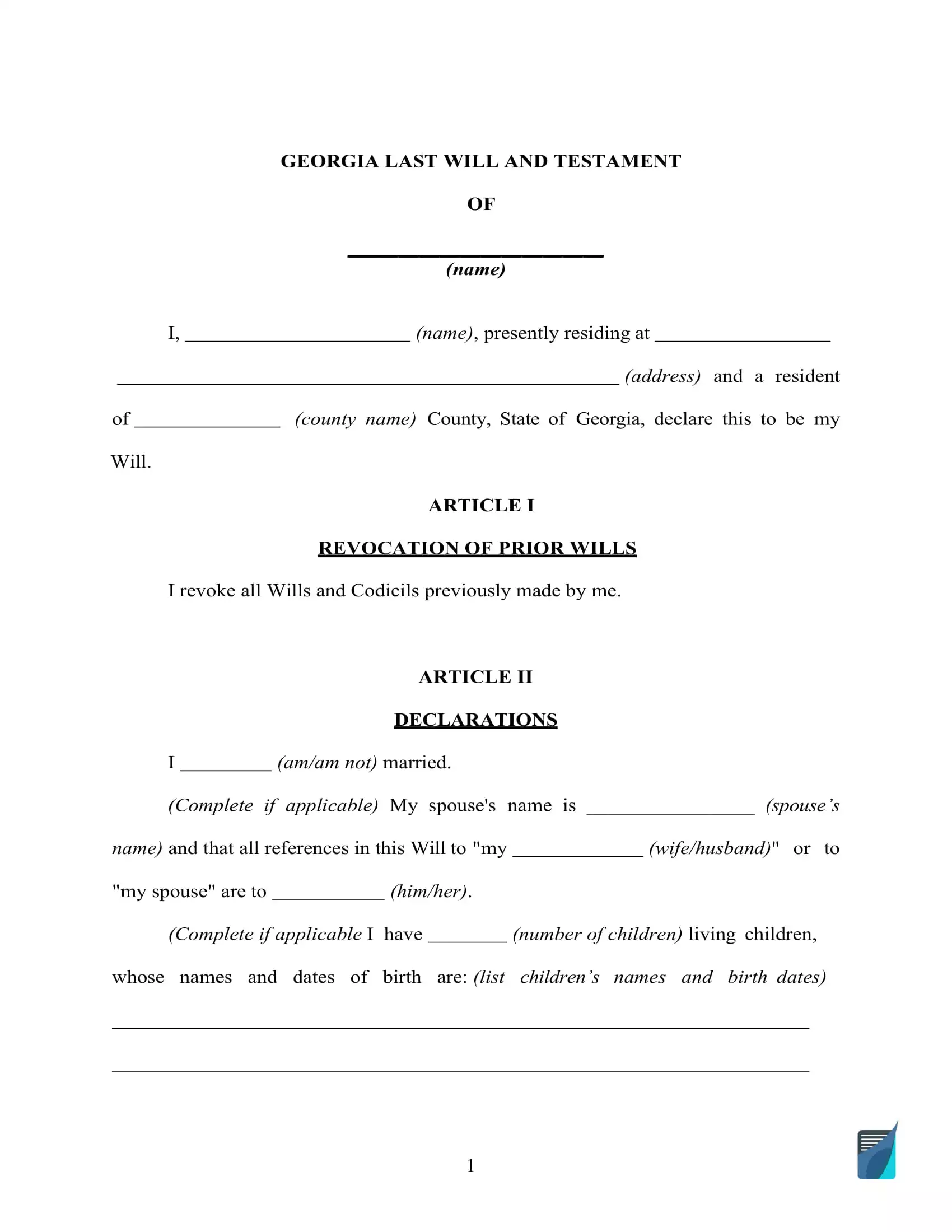
Build Your Document
Answer a few simple questions to make your document in minutes
Save and Print
Save progress and finish on any device, download and print anytime
Sign and Use
Your valid, lawyer-approved document is ready
Georgia Last Will Laws and Requirements
| Requirements | State laws | |
| Statutes | Title 53 – Wills, Trusts, and Administration of Estates; Chapter 4 – Wills | |
| Definitions | Section 53-1-2. Definitions | |
| Signing requirement | Two witnesses | Section 53-4-20. Required writing; signing; witnesses; codicil |
| Age of testator | 14 or older | Section 53-4-10. Minimum age; conviction of crime |
| Age of witnesses | 14 or older | Section 53-4-22. Competency of witness |
| Self-proving wills | Allowed | Section 53-4-24. Self-proved will or codicil |
| Handwritten wills | Might be accepted if witnessed according to state law | Section 53-4-20. Required writing; signing; witnesses; codicil |
| Oral wills | Not recognized | |
| Holographic wills | Not recognized | |
How to Write a Georgia Last Will
1. Think about your possibilities. Determine whether you would like to hire attorneys or write your will yourself (either by handwriting it all or working with a free last will and testament form).
2. Indicate your details. The initial step is establishing the testator by entering their full legal name, as well as the residential information (city, county, and state). Go over the remaining part of the passage, including the details you’ve written and the “Expenses and Taxes” subsection.
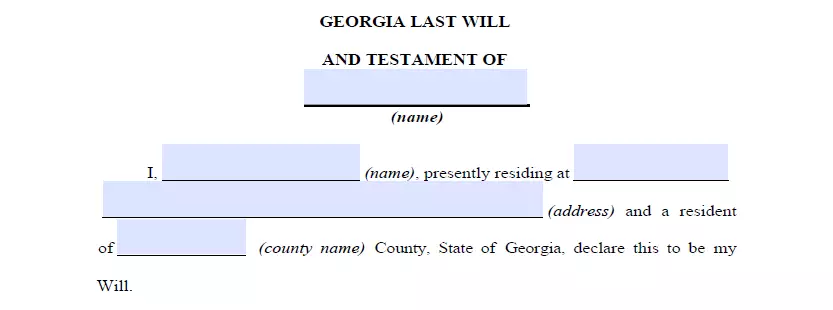
3. Appoint the executor. In this passage, you define who is going to execute your will by filling in their full name, together with their city, county, and state of residence. The vast majority of states have special legislation concerning out-of-state representatives and executors, which usually means extra hassle and red tape. That’s why it’s recommended to choose a person who lives in the same state as you. It may happen that your main representative will be unable to execute your last will as a result of an illness, death, disinclination, or other factors. In this case, the court will probably appoint its own agent to carry out the responsibilities. In order to prevent that, you can choose an additional executor by indicating the same information you did for the first one.
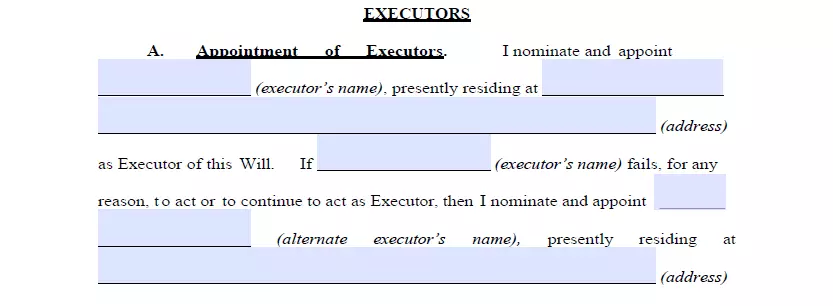
4. Choose the guardian (optional). Should you’ve got minor or dependent children and don’t want the court to pick a guardian for the kids when you are no longer here, it is possible to specify a friend or acquaintance as a guardian for your children.
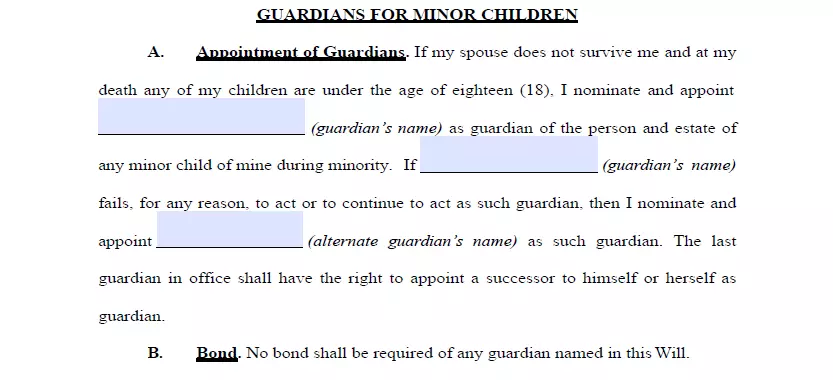
5. Establish your beneficiaries. This is where you indicate those who are going to inherit your estate. Fill in their full names, addresses, and your relationship to them (spouse, child, friend).
6. Allocate property. When you have got a property distribution in mind that is different from proportional, you can describe it within this section. Property can include cash, shares, real estate, business ownership, money for arrearage, and any material items of commercial value you possess. But, joint and living will assets, along with your life insurance, can’t be put into your will.
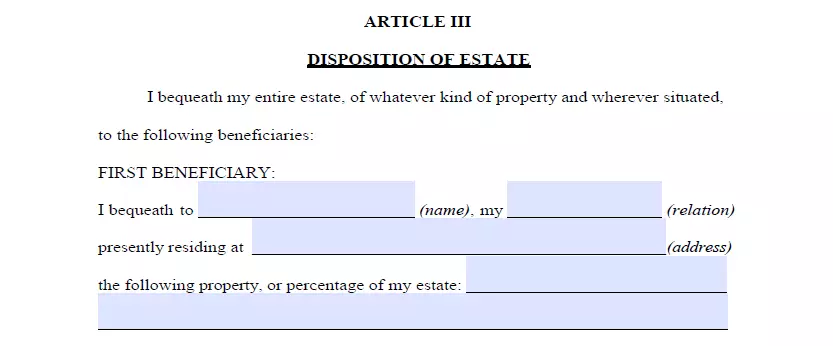
7. Proceed with the witnesses signing the document. According to Georgia law, for a last will and testament to be considered legally correct, it needs to be signed by two witnesses. You are able to appoint someone as a witness provided that they’re over the age of 14 years and are disinterested in your heritage. Think about picking witnesses younger than you to make sure that they can be present in case the will is contested in the court or if any other problem arises. After a complete revision of each passage in your will, all parties involved (you and the two witnesses) must write their names and full addresses and sign the document.
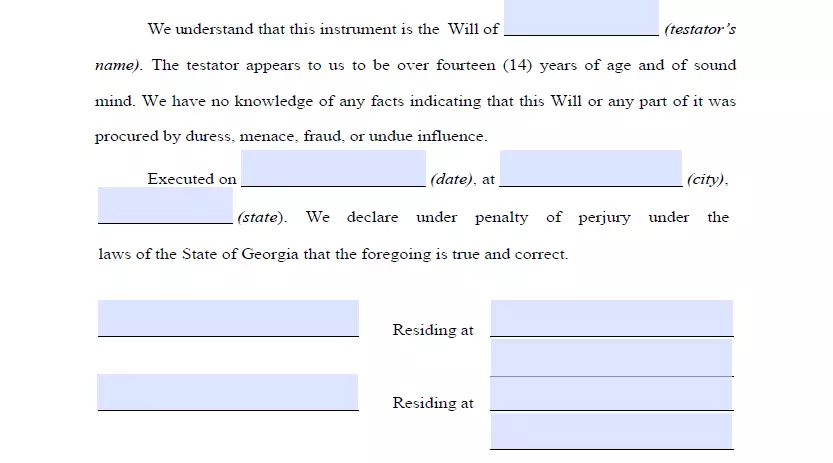
Create a Free Georgia Last Will and Testament
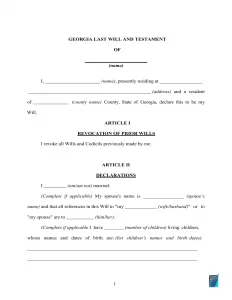
Frequently Asked Questions
Should I attest my will in Georgia for it to be valid?
A will in Georgia is valid without a notary certification. The minimum requirement is having the will signed by two credible witnesses.
What does it imply to be testamentary capable?
In Georgia, to write a will, you have to be of sound mind and at least 14 years old. “Sound mind” translates that you do not have any type of mental disorder that prevents you from fully realizing the consequences of your actions, such as drafting a last will or any other important document.
Does a will demand a self-proving affidavit in Georgia?
No, in Georgia, there is no such requirement. Yet, adding one can be very advantageous given that it removes the demand for witnesses’ testimony at the time of probate, which eases this procedure considerably.
Is another person permitted to change my last will in any way?
It’s not possible. Only the testator can change their will. Someone else is only able to sign your last will in case you’re physically unable to do it. Based on the Georgia Estate Code, it is possible for another person to sign someone’s last will and testament, providing that it is your directive and in your presence.
What must I do in case my will has been lost?
In case a last will has been lost or damaged, in accordance with Georgia law, the court can accept it. But, such occurrences are very rare.
Georgia law (Ga. Code § 53-4-46) gives a supposition that the absence of the will means it is annulled. This puts the responsibility on the advocate of the will to present evidence of the stated last will. Here’s an example of a case involving a lost will – Westmoreland v. Tallent 549 S.E.2d 113 (2001).
| Related documents | When to create one |
| Codicil | Your last will requires one or several minor changes. |
| Self-proving affidavit | You would like to keep from possible complications in the probate court. |
| Living will | You want to ensure that, if you are incapacitated, you are treated how you’d want to. |
| Living trust | You want to think about an alternative to a will. |

Last Will and Testament Forms for Other States
